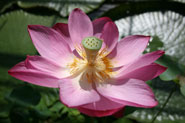Why are flowers the shapes they are? How do they make seeds? What role will they play in feeding a growing global population? These and other questions come under the spotlight at an event at the University of Bristol this Thursday [5 August] when members of the public are invited to join world-leading scientists to explore the science of flowers.
Flower Power for the 21st century begins at 5.30pm in the Victoria Rooms, Queens Road, Clifton, Bristol, BS8 1SA and will be opened by the Lord Mayor of Bristol and Dr Yan Wong of BBC1’s ‘Bang Goes the Theory’. It provides a rare opportunity for local people to meet plant scientists from around the world and share their knowledge and enthusiasm.
The event is part of an international meeting on the science of flowers, fruits and seeds at the University of Bristol this week which brings together around 200 plant experts from the USA, Japan, China, Australia, Brazil and many countries across Europe.
Professor Noni Franklin-Tong of the University of Birmingham has organised the Thursday event jointly with the BBSRC, which is the main research funding council for plant sciences in the UK. She said: “Plants are not only beautiful and fascinating, but also incredibly important. We need them for oxygen, food, clothes, shelter, energy and to look after our natural environment.
“Flowers in particular are amazing and we are very excited to share some of what we have discovered about flowers, fruits and seeds with people in Bristol.”
Professor Simon Hiscock of the University of Bristol’s School of Biological Sciences, who organised the conference, said: “As plant scientists we think about how plants work all the time and we’re always amazed by what they can do.
“It’s really important that we understand flowers and how plants make fruit and seeds because we need to produce 40 per cent more food by 2030 using the same amount of land we already have. The more we learn about the science of flowers, the better we are going to be at improving our crops such as fruits, vegetables and oilseed rape.
“The event on Thursday will be a great opportunity for us to show the people of Bristol quite how remarkable even the simplest of flowers can be.”
Following the opening presentations visitors will be able to explore the exhibition and speak to some of the world’s top experts about flowers, fruits and seeds. Dr Yan Wong will be giving a demonstration and presentation as well as being available to answer questions.
The event is organised by the Universities of Bristol and Birmingham and sponsored by the Biotechnology and Biological Sciences Research Council (BBSRC).
About the conference
The context of the conference is the knowledge that by 2050, the world’s population is projected to increase from 6 to 9 billion and demand for food by 70 per cent. While this demand is rising, the amount of land available for cultivation is likely to shrink due to pressures from other uses, and climate change.
All this means we need to produce and supply enough safe and nutritious food in a sustainable way for a growing global population. This will require significant improvements in both crop yield and ability to withstand environmental impacts.
The 21st biennial congress of the International Association of Sexual Plant Reproduction Research (IASPRR) brings together scientists who are doing underpinning science to help us meet the challenges of food security. This is the first time the meeting has been hosted in the UK.
The conference will cover a range of topics relating to important areas of plant reproduction including evolution, pollination, fertilization and how seeds develop.
